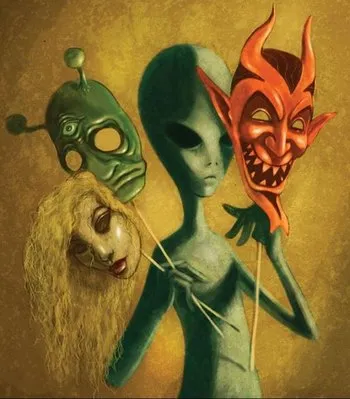Bruce G. Charlton's Blog, page 47
October 29, 2024
Faeries and ETs - appeal to different kinds of person
 An "alien" disguising itself as various faeries
An "alien" disguising itself as various faeriesMany have noticed that there is a generic similarity between reports of sightings and contact with faeries and with Extra-terrestrials (ETs) - and this has been variously explained in Jungian terms, either with or without some objectively real +/- perceptual basis.
In other words; at some deep level (whether psychological or physical), faeries and ETs are "the same phenomenon" that manifests superficially in very different forms.
But the kinds of people who are interested by (and report) faeries versus those interested in ETs, seem quite different in terms of their general stance and motivations.
Faeries are a focus for people with a range of New Age and esoteric interests; those who I would characterize as seeking a reversion towards the ancient and early-childhood consciousness of "Original Participation".
In other words such people seek an escape from the cut-offness and alienation of modern consciousness; and desire immersively to integrate with a living (animated) world; that includes faeries along with animals, plants and landscape.
Thus, faeries seem to serve as an intermediary between Man and Nature - or Man and The Earth more generally.
By contrast; ETs are of interest to people with an alternative ("conspiracy theory") political stance. The idea that alien species from outer space have an interest in the earth, a presence among Men, a desire for contact with Men - and they desire to exert an influence of some kind on this world...
ET enthusiasts therefore usually "place" ETs into a world view that is "mundane", and indeed primarily socio-political. ETs are variously regarded as either/or/both benign and malign in their intentions for the organization and goals of the Earth.
Sometimes ETs are interpreted as intending to protect the earth (eg against catastrophic pollution, or against the possibility of nuclear war) - and also sometimes other kinds of ET are understood to be among or influencing the Global Establishment in their sinister plans to enslave and exterminate Men and the planet.
So, maybe their is some kind of common basis for experience of faeries and ETs; but if so, differences in personality and ideology/ spirituality lead to a different ascribed function, motivation, and human-role for these beings.
Tam Lin - a "strong female protagonist", folklore faeries, and low magic - in the Scottish Borders




We recently visited Carterhaugh and "Tamlane's Well" in Eskdale, in the Scottish Borders west of Selkirk - which is the location for one of the most famous of the supernatural ballads: Tam Lin.
(Note - the above are not my pictures.)
While Thomas the Rhymer is a high magical ballad, dealing with matters of elves as a third kind (neither Men nor angels) death and prophecy - and a possible source of insight and enhanced power; Tam Lin is much more of a folkloric depiction of faeries: beautiful yet dangerous because alien.
And the ballad of Tam Lin is a love/lust story, focused on the need for human courage and ingenuity in dealing with the Fair Folk.
While the most famous recording of Tam Lin is by Fairport Convention; I personally don't much enjoy it, nor any of the others I have encountered except for the incomplete version by The Pentangle, used in that weird, flawed, but somewhat interesting, 1970 movie.
Tam Lin continues to exert a fascination across recent decades, especially for women singers; probably because it may be taken as a prototype of a currently dominant narrative trope of a spunky heroine who falls in love with, and redeems, a dangerously attractive Bad Boy.
...Although naturally; being a traditional and orally-transmitted poem (with many, and contradicting, variants!) the original Tam Lin does this now-clichéd trope much better than modern Hollywood!

Stephanie Beacham as Janet, Ian McShane as Tam ("Tom") Lin, in the 1970 movie - depicting her "Have I just made a terrible mistake?" moment.
October 28, 2024
Fakers and frauds can be very clever and industrious (as well as the opposite)

Not by Vermeer
I recently attended a lecture on frauds in the world of fine art, especially painting - the more notorious examples of those who pass-off their own work as that of famous, prestigious, expensive painters from the past.
My take-home message was that the world of fine arts is rife with fakes, the "experts" are easily fooled (and indeed an integral part of the scam), and some of the fakers are not just skilled but very clever in marketing their forgery by indirect and non-obvious means.
I also read more about a notorious and very successful Welsh literary faker called "Iolo Morganwg" (Edward Williams) - who was so skilled, industrious and clever that his frauds have become inextricably bound-up with Welsh literary history (and the history of revived neo-druidry).
My own reading has led me to consider an influential twentieth century mystic called Wellesley Tudor Pole; and the eventual conclusion that he was essentially (but, of course, not wholly - successful examples never are) a fraud and liar - also clever, capable, industrious, and charismatic.
It is not exactly Big News that the world of esotericism and mysticism has many fakers and frauds, but perhaps it is more surprising that some of the most feted instances of art are (at least I believe) fakes. These are fields in which the basic set-up makes it easier to be fraudulent. But nowadays the same applies everywhere of which I have expert knowledge, such as science (and especially medical research - as became blazingly obvious in 2020!)
One difficulty in acknowledging this, is that people underestimate the industriousness and strategic thinking of frauds; another is that they underestimate the degree to which truth can be distorted or inverted by "seeding" broadly correct information with a few key falsehoods; another is to underestimate the importance of theory as compared with "facts".
But a further difficulty relates to motivation. What motivates the faker or fraud.
"Normal" people are not only too lazy to be seriously fraudulent, but they lack sufficiently strong motivation. Some frauds seem clearly to be after money, or sex, or status - which are pretty normal motivations.
However, not all fakers and frauds are impelled by normal motivations, or else their "normal" motives are so extreme as to become abnormal. Normal people are too normal for them to realize the strangeness of motivations in the kind of people who do become successful frauds.
I include myself here! The motivations of some people can be so strange as to be utterly obscure, and this fact strongly protects (Frauds and Fakes (F and Fs) from detection.
This can be such a strong block on understanding, that even solid and certain examples of fraud tend to be neglected, ignored, or forgotten - because thy just don't "make sense" to people, and can't be integrated into their ideologies and schemes of understanding.
All of this is extremely important in terms of someone seeking "the meaning of life"; and addressing ultimate questions. Because it is quite likely that the "experts" and "wise men" that we encounter in our searchings will - no matter in what domain we are searching - include some (perhaps many) frauds and fakes.
And yet the evidence suggests that these frauds and fakes are not detectable by any feasibly attainable level of expertise and specialized knowledge - and with the time and energy we have available.
So what can we do, in practice?
In my experience, the best guide - and maybe the only guide - is when we have a genuine intuitive conviction that some kind of fakery and fraud is afoot...
When the "alarm bells" go-off (often subconsciously, at first; or subtly) of the time we encounter a person or work - a sense that somebody is "up to something", and "not what they seem" - or, more exactly, not what they are trying to make us believe.
Yet a great deal of modern culture is (for obvious reasons!) dedicated to inducing us to ignore, systematically, such intuitive promptings - and to induce other, alternative, external, cultural, "fake intuitions" - especially that somebody or some-thing that is actually-good (true, beautiful, virtuous) is instead untrustworthy.
"They" want us to reject as F&F exactly that which we most need and would most benefit us.
Therefore, even in terms of what seem to be our own intuitions of validity, we need to apply our best-possible and deepest intuitive awareness; and to become aware of the difference between a real intuition, and something that has been artificially - perhaps subtly and deviously - implanted; including implanted in exactly the strategic and indirect fashion that fakes and frauds pass-off their work.
This may sound superficial, but isn't - at least not if your metaphysical assumption is that we really do have a real - eternal and potentially divine - self; that can form a genuine bottom-line for our knowledge.
October 24, 2024
Did Jesus make a better world?
So many aspects of Christian theology seem to take it for granted that Jesus made a better world. That the world after Jesus was better than the world before Jesus.
If this was truly so, then the world should have undergone a very obvious transformation in or around 33AD.
One would expect massive disagreement as to why this had happened, and even disagreement about whether or not this massive change had been for the better or worse. But that this had happened - that the world (indeed the universe) had been transformed at this time would - presumably - have been so obvious as to require no argument.
Yet that is not the case. Nobody seriously argues that the world underwent an unique and qualitative change around AD33.
I regard this as a powerful argument against this-worldly interpretations of Christianity - and this-worldly interpretations of Christianity were those that I nearly always came across when I was an atheist.
On the other hand, if we take Jesus as his own word in the Fourth Gospel; then his work was not about this world, but the next world: not so much about what happens in life, but instead mostly about what happens after death.
Therefore it is unsurprising if the world did not change in any obvious way during or after the ministry and death of Jesus.
I put this forward as an instance of the way in which Christians need to be careful, much more careful than they generally have been, about how they describe the faith, and the aspects that they emphasise. To advocate Christianity as a means to the end of a better life or a better world, seems like a good idea in the short term - but it is fundamentally false and alien to reality. And, sooner or later, this tactic will - and rightly - discredit Christianity.
October 23, 2024
Just because some of Them hate a person, does not mean that he is Good; because the Western Establishment is increasingly divided into warring factions
Just because some of Them hate a thing or a person, does not mean that the thing or person is Good; because the totalitarian Establishment is increasingly divided into warring factions.
(Tow wrongs don't make a right; a double-negative is not a positive; when somebody-you-hate hates a person - that doesn't imply that you ought to like him; after all, your enemy's enemy may be your enemy as well!)
Whereas in 2020, the mass media and world leaders were globally united in their evil strategy rooted in the birdemic response; now the Establishment is divided - and indeed early signs were evident in the antiracism-fuelled anarchic violence late-summer in that year.
Such engineered outbursts distracted-from and broke-up the new "social conventions" (intended to become permanent) of lockdown, distancing, masking, dehumanization, alienation etc.
Especially since early 2022; the global consensus has split into The West and The Rest.
Furthermore; within The West the two motivations of advanced demonic evil: Ahrimanic and Sorathic - that is the bureaucratic-totalitarians and the spitefully destructive warmongers - are engaged in increasingly vicious infighting behind the scenes.
This factionalism leads to tactical zig-zags, conflicting statements in the mass media, and prolonged policy indecision and drift; as can be seen especially with the Fire Nation and Arrakis wars - which veer between attempts at profiteering and pragmatism (to benefit plans for Agenda 2030 and the Great Reset); and reckless escalations and provocations (with massive destruction of people, resources, property, farmland etc).
One surface manifestation of the war between the elites is when hate-campaigns break out against people and things - which ought to be interpreted as fuelled by increasingly bitter infighting among those with power, wealth, influence and status.
A topical example is the US Presidential candidate DT. He is loathed by the globalist totalitarian bureaucrats, as he always has been; and these "mainstream leftists" are as histrionic and unrestrained in their fear and denunciation of DT as they have been since 2015.
But another faction of the ruling class see DT in terms of having potential to accelerate the already spiralling chaos of inter-national war and intra-national violence.
Whether this faction would prove correct in their belief is, of course, unpredictable - but that kind of "support" from within the structures of power, is surely the reason why DT has not been eliminated from competing in the race, and why he may be allowed to win; despite the electoral "machinations" of the bureaucratic totalitarians.
It is important to recognize this, or else you (like so many I have read online) will be misled by the wild, insane and evil attacks on DT and other people and things; into assuming they are therefore a genuinely probable force for Good.
Socio-political optimism is merely an estimate of probabilities - not a virtue (Christian hope is "not of this world")
Socio-political optimism is merely an estimate of probabilities - not a virtue.
The Christian virtue of hope is properly "not of this world". It is directed beyond death, beyond resurrection - towards Heaven.
So, an optimistic estimate of this-worldly (including socio-political) probabilities may be honest or dishonest, objective or manipulative, well-informed or blind, rooted in joy or in fear.
On the other side: pessimism about this world, including pessimism regarding the future socio-political situation, is neither a virtue nor a sin.
In and of itself, pessimism is just a different estimate of future probabilities.
What makes pessimism a virtue or a sin, is the true motivation behind a declaration of pessimism.
In these times, one besetting sin is to despair existentially; to despair of salvation and God's loving creation; because of our personal (incomplete, biased) understanding of the events and probabilities of this-world.
Another besetting sin of these times is optimistic despair... A Micawber-like clutching-at-straws type optimism; motivated by the reality that someone cannot psychologically tolerate the reality of a pessimistic evaluation. This is a refusal to face fear - therefore itself a species of despair; driven by lack of faith in Christian hope.
Whereas; it is virtuous (albeit a fine-line to walk) genuinely to be a joyous, hope-filled, pessimist!
Initiation-transformation versus training in habits
During my work years (and looking back a few of decades) I saw a great change in the conceptualization of a doctor.
The original idea was a scheme by which a doctor was "made" by transforming a suitable young Man via early apprenticeship (at medical school) that implicitly led to initiation as A Doctor. One the doctor had been made, he was essentially left to his own devices.
By the time I retired, this conceptualization has almost vanished, and A Doctor was seen as somebody who did a particular job, and was subject to particular regulatory procedures. The implication was that what made a doctor was a training process, intended to develop and maintain particular desired habits.
So the doctor went from an initiated and transformed person who was self-motivated to do the right things from then-onwards; into a generic employee with the right habits - habits that were generated and sustained by an externally-devised and -controlled system of training and regulation.
Most of this change was motivated by evil: by the Ahrimanic desire for a totalitarian, dehumanised world; in which behaviour controls thinking, and thinking is controlled by system.
But part of the change came from an inner recognition that people were not (or not any more) genuinely transformed positively and lastingly (if not "permanently") by initiatory procedures: that modern people were not genuinely self-motivated, but were in fact externally controlled (especially by the mass media and propaganda).
This was evidenced by the irrationality and rapid changeability of fashions in "everything"; fashions that were simultaneously dysfunctional yet (somehow, at-the-time) irresistible at the mass level.
What happened could be (and was) explained in terms of what "worked" in a stable society, and was appropriate for that; was unsuited to an unstable and rapidly changeable society.
But that did not really make sense; because the actual outcome was simply to convert medicine to generic-bureaucracy linked to the totalitarian ideology - which situation is utterly dysfunctional and without even an incentive for functionality.
Totalitarianism aims at surveillance and control and Man as a generic unit; and its total-nature means that dysfunctionality can be and is denied, hidden, and inverted into pseudo-desired outcomes. This happens by a vast range of monopolistic propaganda, public relations, advertising, "education", and by psychological manipulations.
Yet, the pervasive and apparently irresistible nature of these changes is consistent with an underlying development in human consciousness. What used to be genuinely lastingly transformative and a true "initiation", progressively lost its effectiveness.
People changed - so that what once worked, no longer worked.
I am not suggesting a socio-political solution or answer to the current evil dysfunctionality; because in current socio-political terms there is none.
So long as we live in a system (and ours is vast, multi-national, and includes all major institutions and corporations) - then we are inhabiting an essentially totalitarian world view; an ideology by which any genuinely self-motivated (and/or God-motivated) individuality is regarded as a danger to be ignored, suppressed, or eliminated.
But conscious, explicit, understanding of what is - is a necessary first step towards its transcendence.
And, after all, in ultimate terms we are not alive-and-here in order to make a "better" (ie. more prosperous, comfortable, enjoyable) world.
We are alive-and-here in order to learn from our personal experiences - and to learn in ways that may not be transformative initiations in terms of this earthly and mortal life; but may well be just exactly that when it comes to resurrected eternal life.
October 22, 2024
The Dyadic Holy Ghost
Since I regard God the Creator as dyadic, our Heavenly Parents, Father and Mother (actual, and presumably eternally incarnate, persons)...
And since I regard Jesus Christ's marriage to Mary of Bethany (Mary Magdalene) as a vital and transformative aspect of His work of the Second Creation...
Then it seems to follow - and has a intuitive rightness - that the Holy Ghost is also dyadic, and a consequence of the eternal commitment of Jesus and Mary in love (their "celestial marriage").
I think this is necessary because ultimate creativity comes from the eternal dyadic love of our Heavenly Parents (that is, the concept of creation includes (and/or arises from) love, as it includes freedom and agency - as distinguishable but inseparable aspects).
Thus the Holy Ghost is both guide and teacher, and comforter; and it may be that these aspects reflect Jesus Christ the man and Mary Magdalene the woman; after their death, resurrection and ascension.
In other words (bearing in mind these are emphases, not separate domains), the main theme of Jesus Christ in the Holy Ghost is to contribute discernment and purpose in a long-term, strategic way; while Mary contributes immediate help, here and now, in a tactical way.
Jesus shows us the path, Mary keeps us upon it.
Of course this cannot (even in principle!) be proved from the Gospels; yet the account of Mary in the Fourth Gospel strikes me as compatible by what I have just said - and from other traditions in Christianity.
By my understanding, Mary Magdalene makes five appearances in the The Fourth Gospel: 1, implicitly in Jesus's Marriage at Cana (a passage that seems clearly tampered-with, including by deletions), in the resurrection of Lazarus (Mary's brother), the episode of the ointment on Jesus's feet in Bethany, at the foot of the cross and after Jesus's resurrection.
Mary's concerns in the latter four episodes are very immediate, supportive, "caring" - and indeed it seems possible that Mary had a role in the resurrection of Jesus in a way analogous to John the Baptist's role in the divine but mortal transformation of the pre-baptism Jesus into Jesus Christ.
I get this from the hints contained in the reported conversation between the resurrected Jesus, and Mary, when she was the first to meet Jesus after his death, thus.
John 20: 14... she turned herself back, and saw Jesus standing, and knew not that it was Jesus.[15] Jesus saith unto her, Woman, why weepest thou? whom seekest thou? She, supposing him to be the gardener, saith unto him, Sir, if thou have borne him hence, tell me where thou hast laid him, and I will take him away.[16] Jesus saith unto her, Mary. She turned herself, and saith unto him, Rabboni; which is to say, Master.[17] Jesus saith unto her, Touch me not; for I am not yet ascended to my Father: but go to my brethren, and say unto them, I ascend unto my Father, and your Father; and to my God, and your God.
It strikes me that Jesus may here be talking of their future eternal union - to include the spiritual emanation of the Holy Ghost, available to all who follow Jesus - to happen (only) after Mary's death and resurrection.
In very general terms - to include Mary Magdalene/ of Bethany in the Holy Ghost is a further development and explication of the deadly rejection of the feminine that afflicted Christianity from early-on (and which I blame of the monotheist philosophers who captures and continue to torment Christin theology!)
The progressively increasing emphasis on Mary the mother of Jesus in Catholic practice, I take to be a theologically-distorted - but nonetheless spiritually very valuable - manifestation of the reality of Heavenly Mother, and the wife of Jesus Christ.
The fact that the Blessed Virgin Mary is mainly called-upon for aid and comfort in the difficulties of everyday living, fits with my understanding of the role of the divine feminine in general, and Mary Magdalene in her marriage-into the Holy Ghost specifically.
Joseph Smith, the Mormon prophet, rediscovered the Christian feminine in God; but the CJCLDS have since neglected and suppressed this aspect of Joseph's revelation - and have chosen not to develop it, while never denying it.
I am strongly of the view that an explicit inclusion of Heavenly Mother in the fundamental concept of God, and probably too the Holy Ghost, has (belatedly) become an all-but essential quest or project - for us, here and now.
This is not something Christians can get off-the-peg or from any external source; but something each needs to work-through for himself - by the usual external and internal means of spiritual guidance.
A question worth pondering: Is consciousness ultimately individual, a matter of class, or universally one?
That is pretty obvious in some contexts - but not in others. It's pretty obvious that when some people read Lord of the Rings they experience a very different "outcome" than do others; and the same replies to other works of art.
To some extent, the different responses classify the different flavours of consciousness.
Such differences of outcome related to changed consciousness, extend to differences over a person's lifespan, different cultures, and - maybe less recognized - "generational" differences across time in the lineal culture and among similar classes of person.
Even within close-knit groups, such differences are evident. For instance, my family (both birth family, and wife and kids) all enjoy puzzles such as logic games and crosswords, board games and jigsaws and the like. But I am almost unable to do so. (This deficit seems to have been inherited from my father.)
What I am getting at is that differences of consciousness between times, places and persons, are "the norm" - and probably ought to be expected, but aren't.
When we have a theory of such changes - analogous to the theory of human development from childhood, through adolescence, to adulthood - then variations in consciousness becomes a powerful explanation for understanding changes in the world, and between people.
The first step in such understanding is classification - positing different types of consciousness to different classes of person.
Classification certainly has some validity - but closer consideration reveals that the lines between classes are unclear; and individual variation may be highly significant. Indeed, we may notice that there are rhetorical wars afoot over consciousness:
UniversalThere are those who try always to emphasise the oneness, universality and similarity of all varieties of human consciousness. These people often desire to "make it so" - by a uniformity of propaganda, uniformity of treatment, and enforcing a uniformity of outcome (including the denial of any apparent differences).
ClassThere are others who focus on classes of consciousness (men versus women, between different races, different classes of personality type or intelligence measures, or by naming and distinguishing "generations". So humanity is distinguished by class - and perhaps then divided by class, in terms of treatment, provision, measurement etc.
IndividualAnd there are those who focus on the individual - although such persons in public discourse are nearly always being dishonest about their concern, since a genuine focus on individuals is contradicted by almost all public policy - and indeed is probably incompatible with our kind of civilization (i.e. one which depends so fundamentally on bureaucracy, law, and regulations).
The reality is that oneness, classification, and individuality all have pragmatic value; but at an ultimate and metaphysical - religious or ideological - level, the situation is contested.
At the ultimate level the consideration is truth not convenience; reality not pragmatism. Either Men are ultimately "all the same", or else divided into classes, or else are individuals.
We could also frame the question in terms of God's concern: is it with all Men (or all Beings, perhaps) in an equal and undifferentiated way; with Men as particular classes (e.g. a particular tribe, or civilization, or particular-church members); or is the fundamental relationship with God between God and the individual person?
This is another of those metaphysical assumptions that we all have-already-decided; although we may not be aware of our decision - and we can, of course, change our minds.
A question worth pondering .

October 21, 2024
Things going wrong, or right? In this mixed world of entropy and creation, which is the most amazing?
Of course this world is - well, at least on the face of it - a mixture of things going wrong (degeneration, disease, death and destruction), and things going right.
There are many ways in which people try to make sense of this.
Should we be most amazed when things go wrong and life is bad; or is it more accurate if we expect things to go wrong, and are amazed only if anything-at-all goes right?
Some people - both religious and mainstream-left-secular - seem to have the assumption that everything naturally goes well, and as we would wish - except when deliberately sabotaged by somebody.
I am not exaggerating - this assumption of virtuous functionality is very deeply embedded in all kinds of people.
The idea is that "things" are spontaneously good, unless or until interfered-with opposed or wrecked.
Other people explain the world almost entirely in terms of either "evil" (e.g. various kinds of selfishness - long- and short-term); or as completely random, meaningless, "things-just-happening".
And there is the conviction of "entropy" (which dominates science), that ordered and functional reality is overall and inevitably, running-down and becoming chaotic.
And there are many theories to say why selfishness and the prevalence of evil and/or tendency to chaos produce (or at least give the temporary illusion of) order and functionality (e.g. natural selection purports to explain the evolution of organismal functionality in terms of and underlying entropic tendency in genes).
There are people who say the world is unmixed (fundamentally); that the world actually is perfectly good/ functional/ ordered/ as-intended, and that evil is an illusion...
And there are also people who say the opposite: that the world is just-is evil, and deluded ones are those who see any real good in anything (e.g. that all apparent good is explicable as a covert or devious type of selfishness).
Clearly this is - and rightly so! - quite a problem for people to sort-out! I mean this is a real problem, and unavoidable; with real consequences necessarily eventuating from whatever answer we deploy.
It is a problem for religious people of all stripes; and it is also a problem for un-religious and anti-religious people.
And the range of answers, and the contradictions between answers, shows that the question cannot be solved by more "information", by observations, "empirically" -- since how we interpret the "evidence" is wholly-shaped by the theories (and structural biases) we use to gather and interpret evidence.
Yet unless we sort-out this problem to our own (genuine!) satisfaction; then the world is fundamentally alien and incomprehensible, and we will probably live in a state of confusion, fear - and maybe will resent our life and the world.
The first and essential step (it seems to me) is to become clear and explicit about what it is we actually do believe on this subject!
Few people know this; and many people deny what seems obviously to be the actual assumptions they are living-by. For instance, many people deny they have any assumptions, and assert that they live only by what is obviously and empirically true.
(They get angry and/or change the subject when asked to reflect on their own assumptions.)
After that first and essential step of knowledge; we can then we can explore our own beliefs on the "nature of things"; testing them for coherence, and checking whether "what we say we believe" really is something we personally find believable!
You may then find, as I did, that the things you believe are things that you found profoundly un-believable; things that could not really be true.
Things you do not actually live-by, and things you do not want to live by.
And that can be the basis for positive change.
Because of the vast range of publicly-asserted "answers" to this problem, each with its body of "evidence"; and because these answers all depend (in a somewhat circular fashion) on the theories by which evidence is selected and interpreted - this is a problem that each must solve for himself*.
NOTE: Rather, each person does solve this for himself; indeed each person already has "a solution" to the mixed nature of reality. The difficulty is that the solution by-which they actually live is seldom clearly known to them, and even-more-seldom is their solution acknowledged. Therefore it cannot be evaluated.
Bruce G. Charlton's Blog
- Bruce G. Charlton's profile
- 9 followers



